The real costs of HFO spills
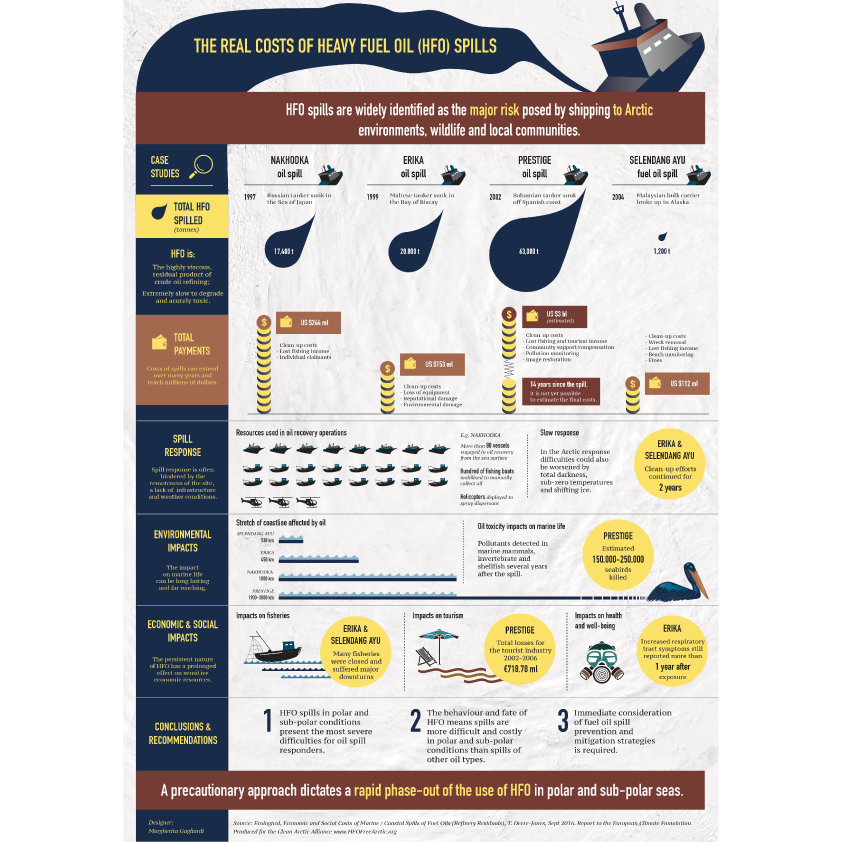
An infographic by the Clean Arctic Alliance
Drawing on the lessons from the social, economic and environmental costs of four major heavy fuel oil spills, this document highlights how a precautionary approach should be applied to protect the Arctic environment from the disastrous consequences of a potential HFO spill.
Clean Arctic Alliance Position Statement
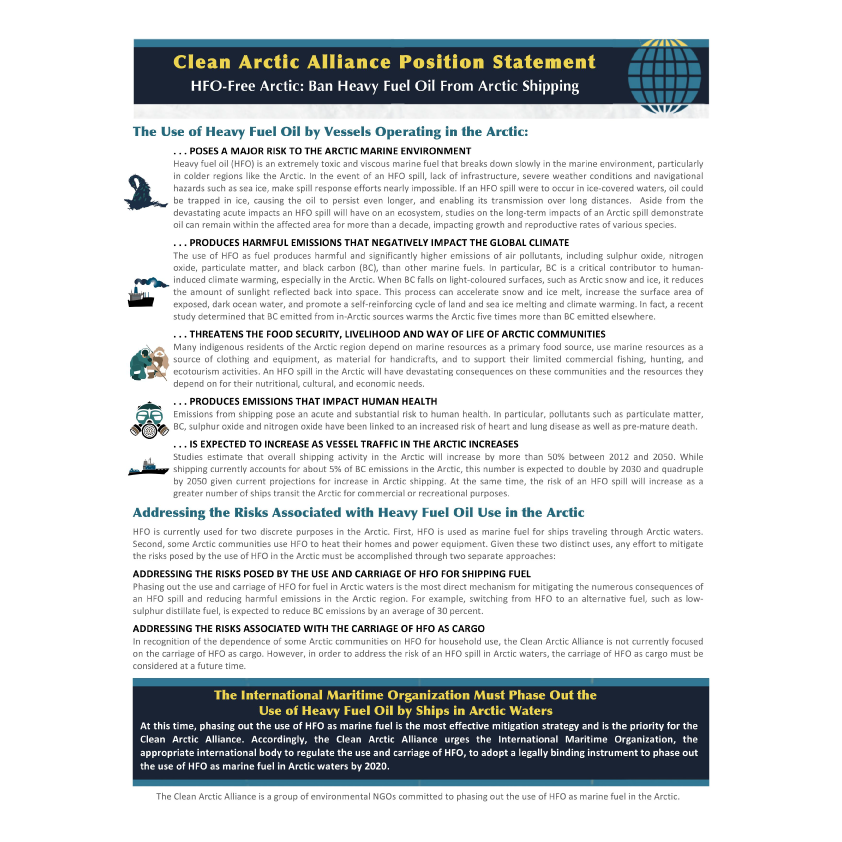
Position Statement by the Clean Arctic Alliance – HFO-Free Arctic: Ban Heavy Fuel Oil from Arctic Shipping
The use of heavy fuel oil (HFO) by vessels operating in the Arctic poses a major risk to the Arctic marine environment. It produces harmful emissions that negatively impact the global climate, threatens the food security, livelihood and way of life of Arctic communities and produces emissions that impact human health. As the use of HFO is expected to rise as vessel traffic in the Arctic increases, the Clean Arctic Alliance strongly advocates the phasing out of the use of HFO as the most effective mitigation strategy as a matter of priority.
Risks & challenges of Heavy Fuel Oil use in the Arctic
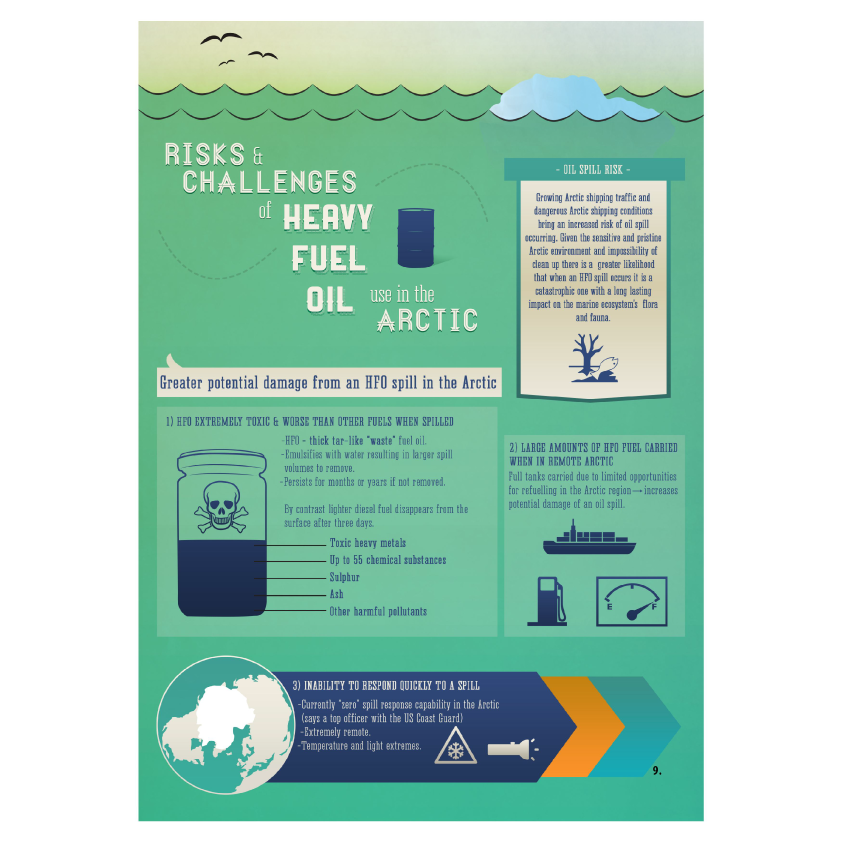
An infographic by the European Climate Foundation
Increased shipping activities and changeable shipping conditions provide the backdrop of this comprehensive and visual representation of the many threats facing the Arctic environment, from heavy fuel oil spill, with catastrophic long-lasting consequences on this remote and vulnerable ecosystem, local indigenous populations’ health and food security to illegal waste sludge dumping. Increased Black Carbon and other air pollutants emissions only accelerate climate change and add to the problem of ice melt.
Ecological, economic and social costs of marine/coastal spills of fuel oils (refinery residuals)
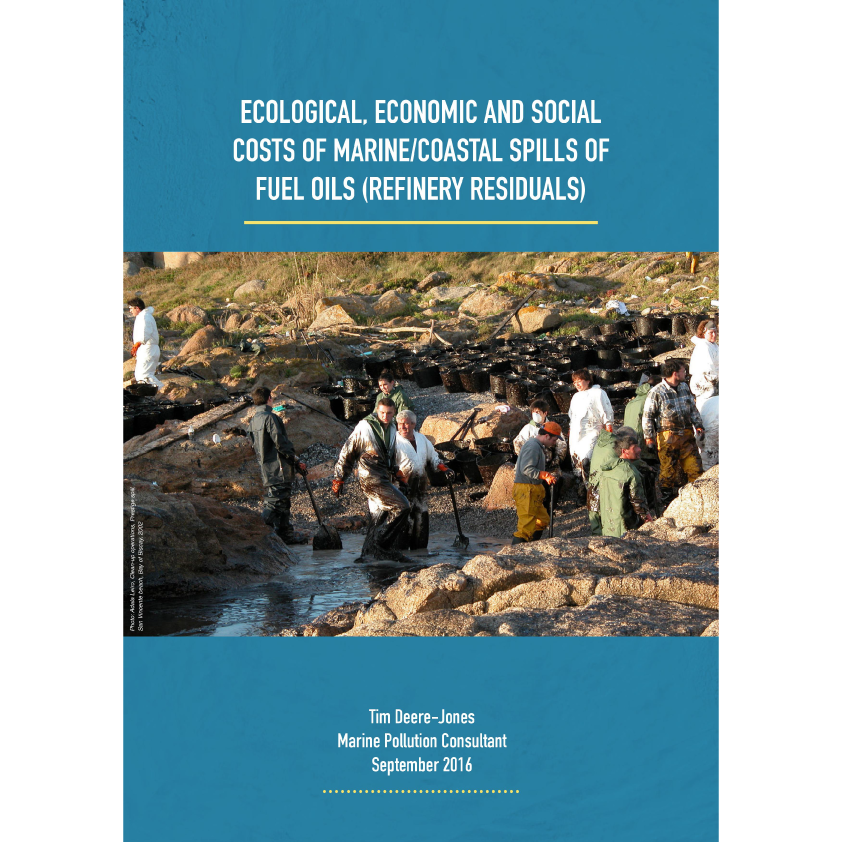
A report by Tim Deere-Jones
The growing demands for shorter, quicker and less expensive sea routes around the northern hemisphere coupled with Arctic warming is generating a significant increase in vessel traffic through Arctic waters. This report offers a brief review of the behaviour and fate of both heavy fuel oil (HFO) and medium fuel oil (MFO) spills in polar, sub-polar and similar cold water marine environments. It also offers a brief review of the impacts of such spills and the relative “costing” of some of the impact parameters of such spills.
Five briefings: Heavy Fuel Oil use by flag state | ship type| ship owner| cruise ships | fishing vessels in the IMO Polar Code Arctic, 2015
Five briefing papers prepared by Bryan Comer PhD, The International Council on Clean Transportation (ICCT)
The use of heavy fuel oil (HFO) as a marine fuel poses serious environmental and economic risks, especially in ecologically sensitive areas like the Arctic. Using HFO is risky not only because of potential fuel oil spills, but also because burning it produces harmful air and climate pollutants, including black carbon (BC). As ship traffic increases in the Arctic, the risk to the Arctic environment and its peoples will also increase.
These 5 briefings look at HFO use by flag state, ship type, ship owner, cruise ships,| fishing vessels in the IMO Polar Code Arctic, 2015.
Five briefings: Heavy Fuel Oil use by flag state | ship type| ship owner| cruise ships | fishing vessels in the IMO Polar Code Arctic, 2015
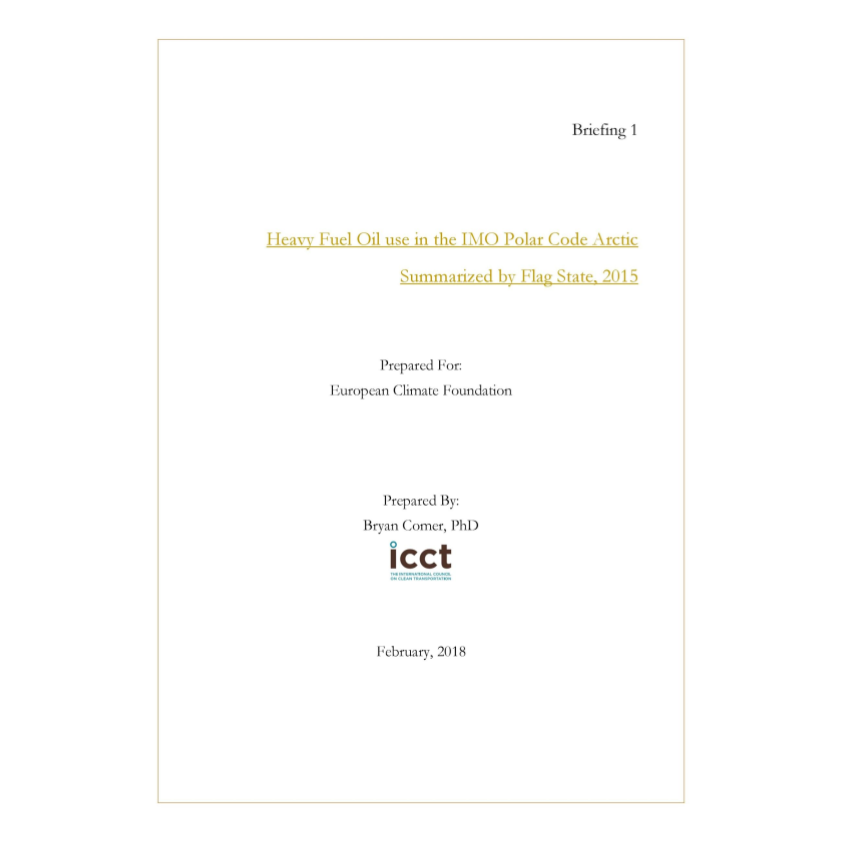
Five briefing papers prepared by Bryan Comer PhD, The International Council on Clean Transportation (ICCT)
The use of heavy fuel oil (HFO) as a marine fuel poses serious environmental and economic risks, especially in ecologically sensitive areas like the Arctic. Using HFO is risky not only because of potential fuel oil spills, but also because burning it produces harmful air and climate pollutants, including black carbon (BC). As ship traffic increases in the Arctic, the risk to the Arctic environment and its peoples will also increase.
These briefings look at HFO use by flag state, ship type, ship owner, cruise ships,| fishing vessels in the IMO Polar Code Arctic, 2015.
Five briefings: Heavy Fuel Oil use by flag state | ship type| ship owner| cruise ships | fishing vessels in the IMO Polar Code Arctic, 2015
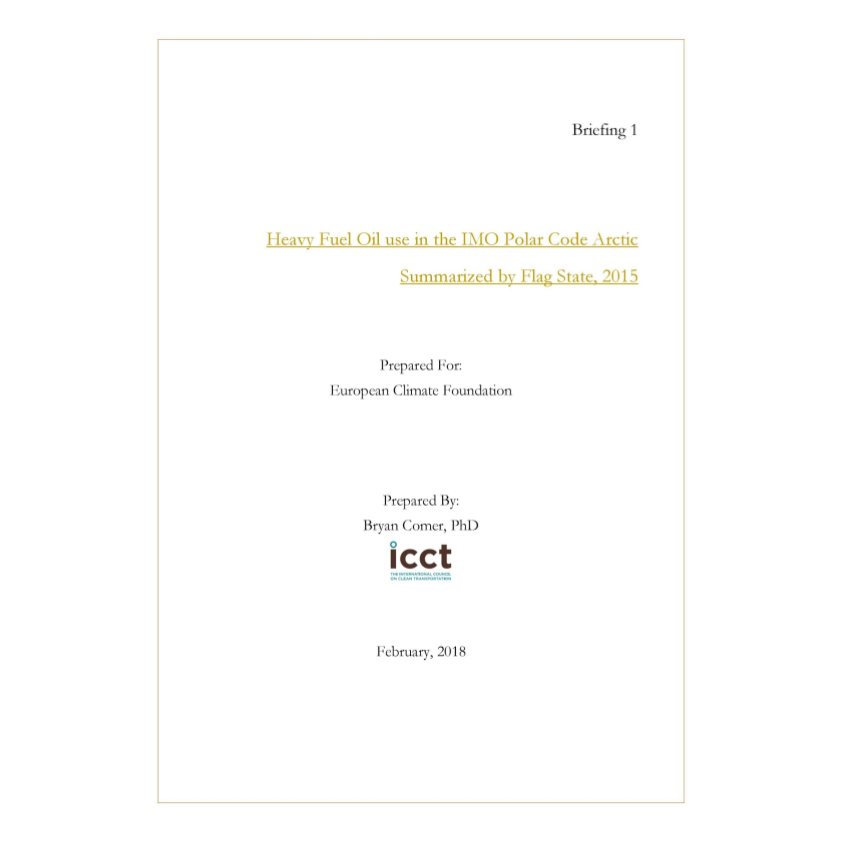
Five briefing papers prepared by Bryan Comer PhD, The International Council on Clean Transportation (ICCT)
The use of heavy fuel oil (HFO) as a marine fuel poses serious environmental and economic risks, especially in ecologically sensitive areas like the Arctic. Using HFO is risky not only because of potential fuel oil spills, but also because burning it produces harmful air and climate pollutants, including black carbon (BC). As ship traffic increases in the Arctic, the risk to the Arctic environment and its peoples will also increase.
These briefings look at HFO use by flag state, ship type, ship owner, cruise ships, fishing vessels in the IMO Polar Code Arctic, 2015.
Ports of Bremen and Bremerhaven Sign Up to Arctic Commitment to Ban Heavy Fuel Oil from Arctic Shipping
The ports of Bremen and Bremerhaven, Germany, have joined an ambitious campaign to ban heavy fuel oil (HFO) from Arctic shipping – along with more than 80 companies, organisations, politicians,NGOs and explorers.
bremenports GmbH & Co. KG, operates the twin ports Bremen and Bremerhaven, which rank as the fourth busiest container port in Europe, and the world’s 16th biggest.
Clean Arctic Alliance Comment on High Sulphur Fuel Ban Agreement
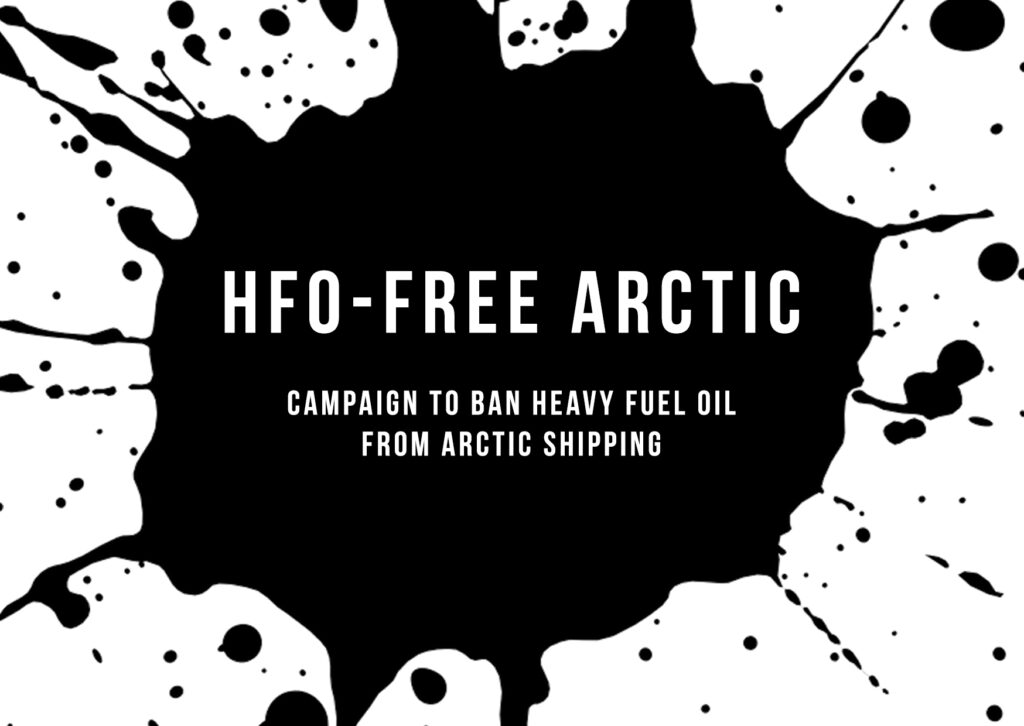
The Clean Arctic Alliance welcomes the 2020 sulphur ban, which should drive a switch away from the use of heavy fuel oil (HFO) towards lighter alternatives – and result in less black carbon released in the Arctic environment”, said Prior. “However, while the sulphur cap will reduce the amount of heavy fuel oil being used anywhere – including in the Arctic – it will not eliminate it completely
MEPC72/11/1: Proposal to Ban Heavy Fuel Oil Use and Carriage as Fuel by Ships in Arctic Waters
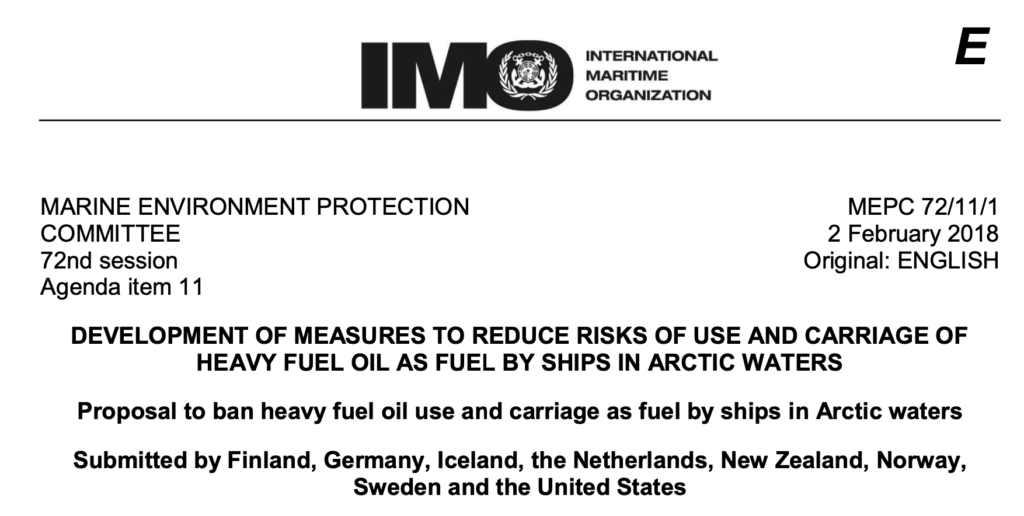
This document contains a proposal to ban the use and carriage of heavy fuel oil (HFO) as fuel on ships in Arctic waters. Submitted by the Finland, Germany, Iceland, Netherlands, New Zealand, Norway, Sweden and United States

